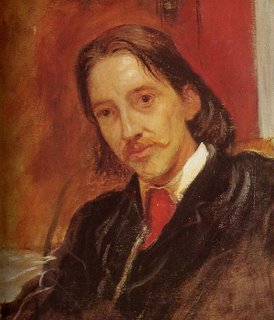13 November: Boreham on R L Stevenson
 The Gay Cavalier
The Gay CavalierThis is the birthday of Robert Louis Stevenson.[1] Stevenson belongs to a select circle of British writers—the circle that includes Charles Lamb, Robert Burns, Thomas Moore, and Lord Byron—who, by some mesmerism that everybody feels but that nobody can explain, contrive to make us very fond of them.
In Stevenson's case, the mystery is not altogether inscrutable. One of his severest critics confesses that it is his chief merit that, himself an invalid, he imparts to all his writings an irresistible impression of lusty robustness and masculine vigour. His monument in St. Giles' Cathedral, Edinburgh, represents him stretched on a couch, propped up by pillows, struggling, in spite of increasing frailty, with the work that he is so passionately eager to finish.
But, turning to the pages of "Treasure Island," "Catriona," or "Kidnapped," nobody would suspect this pallid phase of the author's existence. You never once hear him cough; he whistles and sings; his boisterous laughter is constantly ringing in your ears. Stevenson, it has been said, is the eternal boy. He is always up to mischief. Life is perennially a frolic; it is sparkling, exhilarating, intoxicating; it is essentially well worth while.
A New Version Of Dignity And Impudence
In Stevenson's writings, every syllable is a revelation of his own soul. He approaches romance, as Dr. Compton-Rickett puts it, in the mood of the young man with the cream tarts.
He saw, for example, that boys like penny dreadfuls. Instead of throwing up his hands in pious horror, he studied the psychology of the thing. He soon discovered that stories about corsairs and bandits and pirates and smugglers might be written without stooping to a melodramatic style that made the popular tales of adventure so stilted and ridiculous. So he wrote "Treasure Island," the best boys' book in the language.
As a matter of fact, he wrote it in response to the defiant challenge of a boy. "Why don't you write something really interesting?" his admiring stepson, with youthful impertinence, asked him one day. Stevenson found the incisive question particularly provocative.
Donning his considering cap, he resolved to take up the gauntlet. A day or two later, to the boy's delight, he outlined the plot of "Treasure Island," and he himself has told us of the wild transports of excitement that they both experienced as they spread a sheet of paper on the table, drew a map of the island, gave names to the various geographical features, and determined upon the spot at which the treasure should be hidden.
The Insatiable Appetite for Life
The man who sits at the feet of Robert Louis Stevenson comes to feel, as he did, that the draught of life is a rich and ruddy wine; he breathes an atmosphere of palpitating vitality, spirtual beauty, and exalted romance; he is charmed by a literary style that represents the quintessence of grace, and simplicity; and, best of all, he finds himself infected by a personality glowing with humour, chivalry, and sweetness.
Towards the end he became haunted by the dread that his popularity might decline and that his books might cease to appeal. A tepid review or a critical letter threw him into a cold sweat of nervous apprehension. Harsh judges bluntly attributed these sensations to personal vanity but there was more in it than this. He felt that he had toiled most terribly to bring his work to absolute perfection; and he could not bear to think that, notwithstanding this, he was doomed to failure after all.
His nightmare of departed glory was partly due, too, to his insatiable lust of living. He loved life, loved it wholeheartedly and devotedly; loved it everywhere and all the time; loved it night and day and loved it to the last. He shuddered to conceive of himself as, in any real sense, dead. He felt that it would be great sport to go on living, through his books, long after his brittle body had been buried in some grassy grave.
He died at 44, and, slumbering peacefully on that beautiful Samoan hilltop to which, every year, hundreds of admirers make devoted pilgrimage, he still holds, after nearly 60 years, a place peculiarly his own in the reverent affection of his fellow men.
F W Boreham
Image: Robert Louis Stevenson
[1] This editorial appears in the Hobart Mercury on November 22, 1952.


<< Home